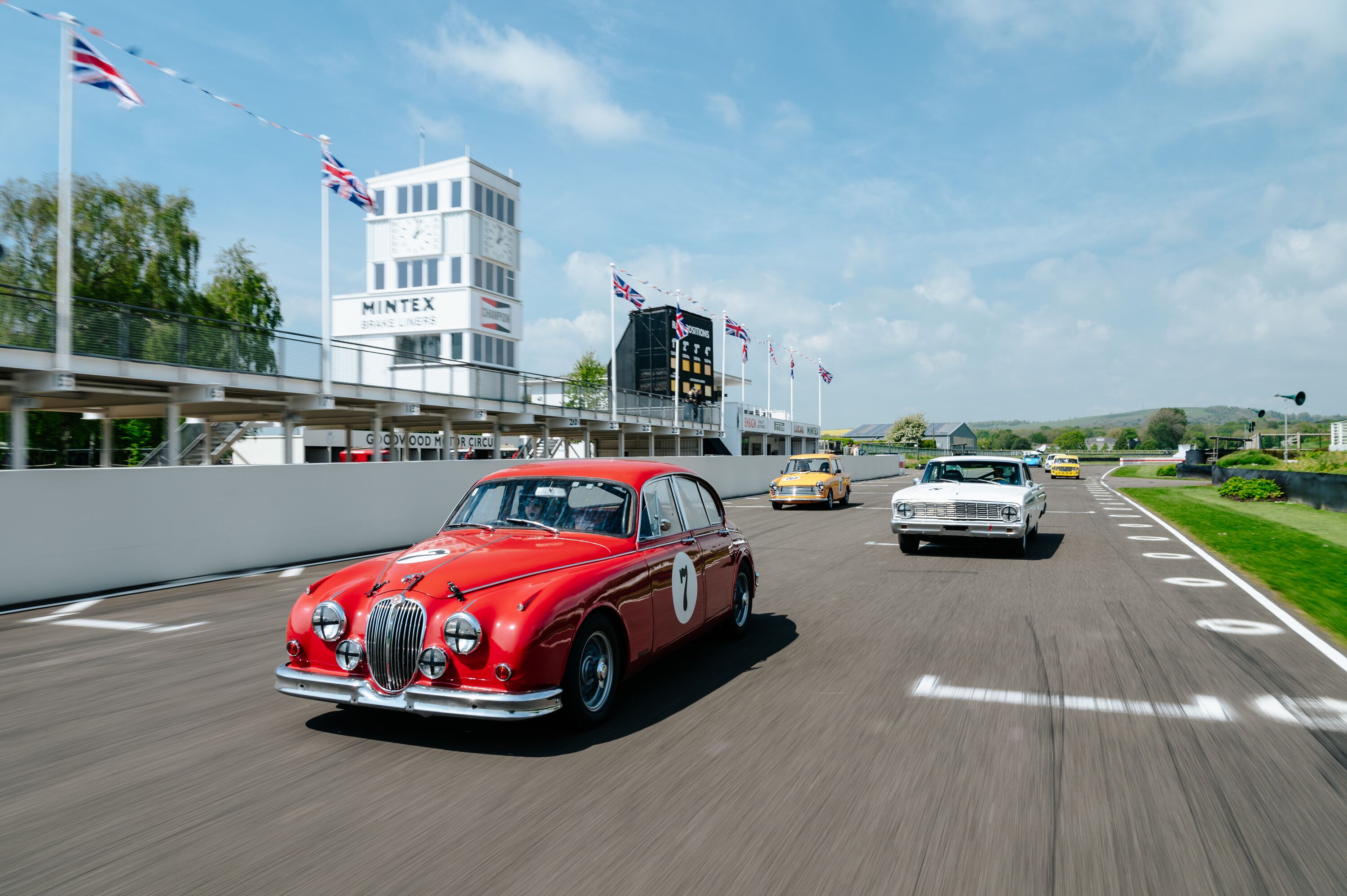I’m not sure why I should be surprised. Last year’s inaugural S.F. Edge Trophy race at the Members’ Meeting was one of surprisingly few I know that I’ll remember forever, so there’s no reason to think this year’s race would be any different. Except, the novelty value of racing Edwardians around Goodwood was gone and there’s nothing like the first time. Is there?
For me, once more teamed up with the oldest Bentley racing in the world, there was. The first surprise is I managed to go a whole lot faster in qualifying this year than last, probably because I’m still learning a type of car I race all too rarely. Despite its centre throttle, crash gearbox, brakeless front axle and the need to pump the fuel through by hand, I’d not call it an inherently difficult car to drive fast, but it is different. Very different. Properly prepared race cars from the fifties and sixties will look after themselves so long as you don’t actively abuse them by using too many revs or repeatedly banging them over high kerbs, but the Bentley needs constantly to be managed if it is to give its modest best. It may only have rear wheel brakes but it still requires you to slow it in two entirely independent movements, initially with your foot (remembering to tread on the right-hand pedal) and then, increasingly, with the external handbrake which operates on the same drums but via different shoes. Its unique updraught Claudel Hobson carburettor allows the throttle to be fully open or completely shut but very little in between and it comes with a lag that would make a 1970s Porsche 911 Turbo seem positively responsive.
But approximately ten years after I first raced it, I feel I’m starting to learn its ways, a fact reflected in the lap time and the fact I somehow wound up seventh on the grid despite having by far the smallest engine in the sharp end of the grid and possibly the entire field of 27 cars. A fast learner I am not.
The race itself was a joyous repeat of the previous year. At the start, everyone ahead disappeared and whatever disappointment I felt at that was more than offset by the relief at seeing almost everyone behind recede in the mirror. Almost everyone. But if you’re not going wheel to wheel with someone, you’re not racing and this year as last it was Duncan Pittaway’s Monarch with its Curtiss aero engine that provided the entertainment. Of course, Duncan himself was otherwise engaged manhandling the Fiat S76 – aka the Beast of Turin – around the circuit, in possibly the most extraordinary single car spectacle to visit this track, at least since it reopened for racing 20 seasons ago. So it fell to Gareth Graham in the Monarch, as it had to Ben Collings in the same car last year, to play cat and mouse with the Bentley.
It wasn’t hard to see who held what advantage where on the track: the Monarch was faster by far in a straight line, it was probably as quick in the slow corners but a little slower through Goodwood’s many quicker turns. But the Bentley had the clear edge under braking.
I quite like being in front in these situations, because while you are the hunted, so too, do you arrive at each challenge first and therefore get to set the agenda. And I knew that if I let Gareth past, his raw speed advantage would make the Monarch almost impossible to overtake because I’d never be close enough at the end of the straight to make the difference under braking. Once, I genuinely thought he’d got me, but I was just able to nip around the outside at Woodcote, but the strange thing is that the longer the battle went on, the less important its outcome seemed to be. Last year the Monarch got past and stayed there, this year it didn’t: so what? What I will remember far more is charging down the back straight with the Monarch thundering along beside me, exchanging thumbs up signals with its driver. That moment, to me at least, encapsulated all that racing at Goodwood should be.
This may have been a race of cars with an average age of over 100 years, but there were still lessons to be learned here, mainly about driving standards. I’ve spoken to so many people before and after the race who said we were all mad to be racing cars that look pretty lethal when parked, let alone when hurtling around Goodwood. But truly it was not as nuts as it probably looked, and for that, I must thank everyone with whom I shared track space. It doesn’t require much imagination to figure out what might happen to open wheel cars like these with such thin tyres and such high centres of gravity if they were to come into contact with each other so everyone drove respecting the fact: hard and fast, but utterly clean and respectful. They drove brilliantly and superb racing was the result.
In the end, I finished where I started in seventh place, having seen off the Monarch challenge but made no advance at all on the cars ahead. But if I’d had that much fun and come twenty-seventh and bog last, I’d scarcely have cared. Once more the S.F. Edge Trophy delighted the crowds and its drivers alike. And once more I left the track for the long journey home with but one thought in my head: might we be allowed to do it all over again in 2018?
Photography by Nick Dungan
75MM
S.F. Edge Trophy
andrew frankel
2017
Pre-War
S.F. Edge Trophy feature








